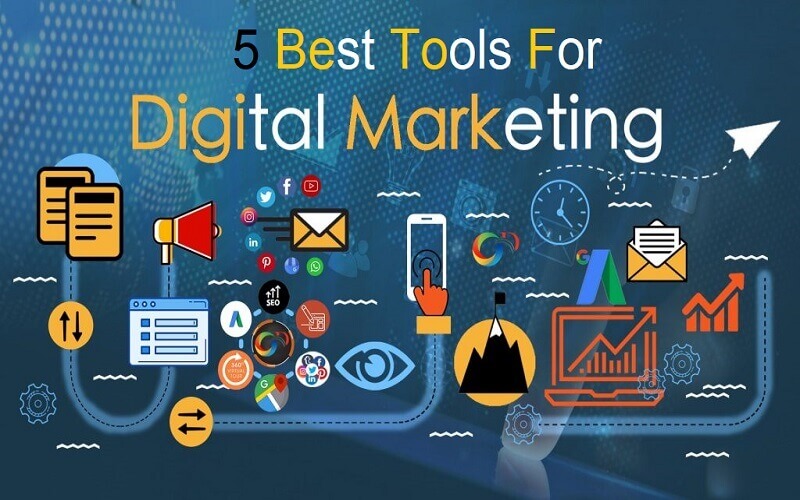Digital Marketing is the “Now” and the “Future” of the marketing world. Be it a small business or a big organization, digital marketing is present everywhere. To ensure the smooth working of these digital marketing techniques, you need to know about the best digital marketing tools available in the industry that you can use.
Don’t worry! We have got you covered here. We have identified and listed the 5 best digital marketing tools that you should learn and use in your marketing efforts.
If you seek to learn about these tools you can enroll in a digital marketing course that will not only teach you how to use these tools but will also provide you insights into preparing digital marketing strategies.
Before knowing about digital marketing tools, let me state some benefits of using these tools.
Benefits of Using Digital Marketing Tools
- Data-driven decision-making: Digital marketing tools provide in-depth analytics and insights, empowering marketers to make data-driven decisions based on real-time performance data and consumer behavior trends.
- Enhanced efficiency and productivity: These tools automate repetitive tasks, streamline workflows, and centralize campaign management, saving time and effort while increasing productivity and allowing marketers to focus on strategy and creativity.
- Targeted audience segmentation: Digital marketing tools offer advanced segmentation capabilities, enabling marketers to precisely target specific audience segments based on demographics, interests, behaviors, and other criteria, resulting in higher engagement and conversion rates.
- Competitive advantage: By leveraging digital marketing tools, marketers gain a competitive edge by staying updated with industry trends, monitoring competitor strategies, and identifying new opportunities to outperform rivals and capture market share.
- Performance optimization and ROI tracking: These tools enable marketers to track and measure the effectiveness of their campaigns, allowing for continuous optimization, identifying areas for improvement, and demonstrating the return on investment (ROI) of their digital marketing efforts.
Bonus Tip: To know about even more helpful digital marketing tools and understand them you can visit Digital Vidya.
Now without further delay let us together go through and know about digital marketing tools.
5 Best Digital Marketing Tools for Every Marketer
-
Google Analytics
Google Analytics is a comprehensive web analytics platform offered by Google. It allows marketers to track and analyze various aspects of website performance, user engagement, and conversion rates.
By implementing a tracking code on their website, marketers can gather data and gain a deeper understanding of how users interact with their site.
Features of Google Analytics
Google Analytics offers a rich set of features that empower digital marketers to extract meaningful insights from their website data. Some notable features include:
Audience insights: Marketers can analyze visitor demographics, interests, and behaviors, enabling them to tailor their marketing efforts to specific target audiences.
Traffic sources: Google Analytics provides information about how users discover the website, such as organic search, paid advertising, social media, or referrals. This helps marketers understand which channels are driving traffic and allocate resources effectively.
Conversion tracking: Marketers can set up and track goals to measure the success of their marketing campaigns. This data helps identify the most effective channels and strategies for driving conversions, facilitating data-driven decision-making, and campaign optimization.
Benefits of Using Google Analytics
Google Analytics offers numerous benefits for digital marketers striving for success. Some key advantages include:
Data-driven decision-making: With access to in-depth analytics and insights, marketers can make data-driven decisions based on real-time performance data and consumer behavior trends.
Performance optimization: Google Analytics allows marketers to identify areas of their website that may need improvement. By analyzing user behavior and engagement metrics, marketers can optimize their websites for better user experiences and increased conversions.
Audience targeting: With audience insights, marketers can segment their audience based on demographics, interests, and behaviors. This enables them to deliver targeted and personalized marketing messages, resulting in higher engagement and conversion rates.
Campaign effectiveness: Google Analytics helps marketers measure the success of their marketing campaigns by tracking conversions and attributing them to specific channels or campaigns. This enables marketers to identify the most effective strategies and allocate resources accordingly.
Continuous improvement: By regularly monitoring and analyzing data, marketers can identify trends, set benchmarks, and measure progress. This facilitates ongoing optimization and allows marketers to refine their strategies for better results over time.
-
MailChimp
MailChimp is a comprehensive email marketing platform that allows marketers to create, send, and track email campaigns. It offers a user-friendly interface, making it accessible to both beginners and experienced marketers.
With its robust set of features, MailChimp enables marketers to build engaging email campaigns, automate workflows, and measure campaign success through detailed analytics.
Features of MailChimp:
MailChimp provides a range of features that empower digital marketers to create and optimize their email marketing campaigns:
Email automation: MailChimp allows marketers to set up automated email workflows based on triggers and conditions. This feature helps nurture leads, welcome new subscribers, send abandoned cart reminders, and more, ensuring timely and relevant communication with the audience.
Segmentation and personalization: With MailChimp, marketers can segment their email lists based on various criteria such as demographics, interests, or past interactions. This enables targeted messaging and personalization, leading to higher engagement and conversion rates.
Email templates and design tools: MailChimp offers a library of pre-designed templates and customizable drag-and-drop design tools, making it easy to create visually appealing and professional-looking emails without any coding knowledge.
A/B testing: Marketers can experiment with different email subject lines, content variations, or send times using MailChimp’s A/B testing feature. This allows them to optimize their campaigns based on data-driven insights and improve open rates and click-through rates.
Benefits of Using MailChimp:
MailChimp provides several benefits for digital marketers looking to maximize the impact of their email marketing efforts:
Efficient campaign management: MailChimp centralizes email campaign management, allowing marketers to streamline their processes, schedule emails, and maintain consistency across multiple campaigns and target segments.
Advanced analytics: MailChimp provides detailed analytics and reports, including open rates, click-through rates, and subscriber engagement metrics. This data enables marketers to assess the success of their campaigns, identify areas for improvement, and make data-driven decisions.
Improved audience engagement: With features like segmentation and personalization, marketers can send highly targeted and relevant emails to their subscribers. This enhances engagement, increases the chances of conversions, and strengthens customer relationships.
Time and resource savings: MailChimp’s automation features help save time by automating repetitive tasks and workflows. Marketers can focus on strategy, content creation, and analyzing campaign performance instead of manual execution.
Scalability and integration: MailChimp scales with businesses of all sizes, from startups to large enterprises. It also integrates with other popular marketing tools and platforms. Such as e-commerce platforms or customer relationship management (CRM) systems, providing a seamless experience for marketers.
-
SEMrush
SEMrush is an all-in-one SEO and digital marketing platform that offers a wide range of tools to enhance online visibility and drive organic traffic.
It provides valuable data and insights to help marketers optimize their websites, track keyword rankings, analyze competitors, and identify new growth opportunities.
Features of SEMrush:
SEMrush offers a variety of features that empower digital marketers to optimize their SEO strategies and gain a competitive advantage:
Keyword research: SEMrush provides comprehensive keyword research tools, allowing marketers to discover relevant keywords, analyze search volume, and identify keyword difficulty. This data helps optimize content and target the right keywords for higher search engine rankings.
Competitor analysis: With SEMrush, marketers can analyze their competitors’ websites, identify their top-performing keywords, and gain insights into their organic and paid search strategies. This information enables marketers to refine their strategies and discover new opportunities.
Site auditing: SEMrush’s site auditing feature allows marketers to identify and fix technical SEO issues that may hinder website performance. By optimizing website health and addressing issues such as broken links or slow page speed, marketers can improve search engine rankings and user experience.
Backlink analysis: SEMrush provides insights into a website’s backlink profile, including the number of backlinks, their quality, and the referring domains. Marketers can analyze their backlink profile, identify opportunities for link-building, and monitor the effectiveness of their link-building efforts.
Benefits of Using SEMrush:
SEMrush offers several benefits for digital marketers aiming to enhance their SEO strategies and drive organic traffic:
Informed decision-making: SEMrush provides in-depth data and insights that empower marketers to make informed decisions. From keyword research to competitor analysis, marketers can identify trends, understand market dynamics, and optimize their strategies accordingly.
Competitive advantage: By analyzing competitors’ strategies, marketers can identify gaps, discover new keyword opportunities, and stay ahead of the competition. SEMrush’s competitor analysis features provide valuable insights for refining marketing strategies and capturing market share.
Enhanced search engine rankings: With SEMrush’s keyword research and site auditing capabilities, marketers can optimize their websites for better search engine visibility. By targeting relevant keywords and addressing technical SEO issues, marketers can improve their search engine rankings and drive organic traffic.
Improved content marketing: SEMrush helps marketers identify content gaps, analyze the performance of existing content, and discover new content ideas. This enables marketers to create high-quality, targeted content that resonates with their audience and drives engagement.
Comprehensive reporting: SEMrush offers robust reporting capabilities, allowing marketers to track keyword rankings, monitor website performance, and analyze campaign results. This data helps measure the effectiveness of SEO efforts, demonstrate ROI, and make data-driven decisions.
-
Buffer
Buffer is a comprehensive social media management platform that allows marketers to schedule and publish posts across multiple social media platforms from a single dashboard.
It offers a user-friendly interface and a range of features to streamline social media management tasks and enhance overall efficiency.
Features of Buffer:
Buffer provides a variety of features that enable digital marketers to manage their social media presence effectively:
Post scheduling: Buffer allows marketers to schedule posts in advance, ensuring consistent and timely content delivery across social media platforms. Marketers can plan their content calendar, optimize post timing for maximum reach, and maintain a consistent posting schedule.
Social media analytics: Buffer offers analytics and reporting features that provide insights into post performance, engagement metrics, and audience growth. Marketers can track key metrics, measure the effectiveness of their social media strategies, and make data-driven decisions.
Content curation: Buffer facilitates content curation by allowing marketers to discover and share relevant and engaging content from trusted sources. Marketers can curate industry news, articles, and videos to provide value to their audience and maintain an active presence on social media.
Team collaboration: Buffer’s team collaboration features enable marketers to collaborate with team members, assign tasks, and manage workflows efficiently. This ensures smooth coordination and enhances collaboration in creating and executing social media campaigns.
Benefits of Using Buffer:
Buffer offers several benefits for digital marketers seeking to optimize their social media management:
Time savings: By scheduling posts in advance, Buffer helps marketers save time and effort in manual posting. Marketers can dedicate focused time to create content, planning strategies, and engaging with their audience, resulting in improved efficiency.
Streamlined management: Buffer’s centralized dashboard allows marketers to manage multiple social media platforms from a single interface. This streamlines the process of posting, monitoring, and engaging with the audience, eliminating the need to switch between different platforms.
Data-driven decision-making: Buffer’s analytics and reporting features provide valuable insights into post performance, engagement, and audience growth. Marketers can make data-driven decisions, refine their social media strategies, and optimize content for better results.
Consistent branding: Buffer helps maintain a consistent posting schedule and brand voice across social media platforms. Marketers can plan and schedule content in advance, ensuring a cohesive and cohesive brand presence, which enhances brand recognition and audience engagement.
Audience Engagement: Buffer’s features enable marketers to engage with their audience effectively. By scheduling posts at optimal times and staying active on social media, marketers can foster meaningful interactions, respond to comments and messages promptly, and build stronger connections with their audience.
-
Hootsuite
Hootsuite is a comprehensive social media management platform that allows marketers to schedule, manage, and analyze their social media activities from a centralized dashboard.
It supports various social media platforms, providing a unified interface for managing multiple accounts, scheduling posts, monitoring conversations, and analyzing performance.
Features of Hootsuite:
Hootsuite provides a range of features that empower digital marketers to efficiently manage their social media presence:
Social media scheduling: Hootsuite enables marketers to schedule and publish posts across multiple social media platforms. Marketers can plan and create content in advance, schedule posts for optimal times, and maintain a consistent social media presence.
Social listening and engagement: Hootsuite allows marketers to monitor social media conversations, track brand mentions, and engage with their audience in real time. Marketers can respond to comments, messages, and mentions, fostering meaningful interactions and building stronger connections with their audience.
Content curation and publishing: Hootsuite facilitates content curation by providing access to content discovery tools and allowing marketers to curate and share relevant content from trusted sources. Marketers can easily find and share industry news, articles, and videos. Providing value to their audience and maintaining an active presence.
Collaboration and team management: Hootsuite’s collaboration features enable marketers to work together seamlessly as a team. Marketers can assign tasks, manage workflows, and coordinate social media activities efficiently, ensuring smooth collaboration in content creation and scheduling.
Benefits of Using Hootsuite:
Hootsuite offers several benefits for digital marketers seeking to optimize their social media management:
Time savings and efficiency: Hootsuite’s scheduling and automation features save time by allowing marketers to plan and schedule posts in advance. Marketers can focus on content creation, strategy, and engagement, rather than manually posting content on multiple platforms.
Centralized management: Hootsuite provides a centralized dashboard for managing multiple social media accounts and platforms in one place. This streamlines the process of monitoring, posting, and engaging, eliminating the need to switch between different social media platforms.
Real-time engagement: Hootsuite’s social listening and engagement features enable marketers to monitor conversations, respond to comments and messages promptly, and engage with their audience in real time. This facilitates meaningful interactions, strengthens relationships, and enhances brand reputation.
Data-driven insights: Hootsuite’s analytics and reporting features provide valuable insights into social media performance, engagement metrics, and audience demographics. Marketers can track key metrics, measure the effectiveness of their social media strategies, and make data-driven decisions to optimize their campaigns.
Scalability and integration: Hootsuite scales with businesses of all sizes, from small startups to large enterprises. It also integrates with other tools and platforms, such as content management systems (CMS) and customer relationship management (CRM) software, providing a seamless experience for marketers.
Final Thoughts
As digital marketing is continuing to rise and grow, these tools will be your best friends in conducting marketing efforts easily and effectively.
It’s crucial to understand that not all tools are suitable for every business. The effectiveness of tools depends on specific goals and the intended audience.
The key is to try out different tools and discover the ones that work best for your business. It’s also important to stay updated on the latest trends in digital marketing to seize new opportunities as they emerge.
With the best digital marketing course in Delhi with placements, you can stay updated with all the latest trends and even learn the art and technique of digital marketing. Plus you can attain amazing job opportunities to work hands-on on these amazing tools.
FAQs
-
What is the best tools for digital marketing?
Some of the best tools are:
- Google Analytics
- MailChimp
- SEMrush
- Buffer
- Hootsuite
-
What are the main digital marketing categories?
The main digital marketing categories are SEO, social media marketing, email marketing, content marketing, and paid advertising. Each category plays a vital role in a comprehensive digital marketing strategy. Businesses often utilize a combination of these categories to achieve their marketing goals.
-
“What are the 7 Cs of digital marketing that you know?
The 7 Cs of digital marketing are Content, Context, Connection, Community, Commerce, Customization, and Conversion. These elements collectively contribute to successful digital marketing strategies by focusing on delivering valuable content, building meaningful connections, and driving conversions.
-
What are the 4 keys of digital marketing?
The four main aspects of digital marketing are: reaching the right people, sharing useful content, using data to learn, and being flexible to adapt and improve.



